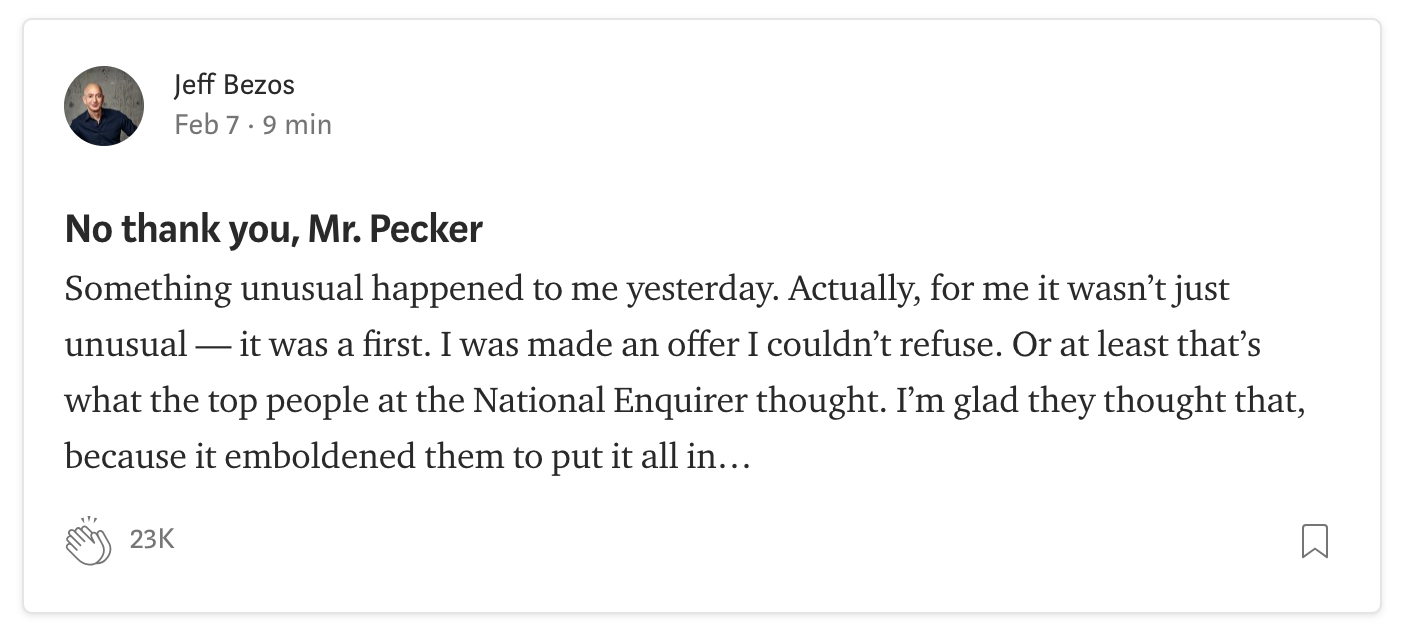Jeff Bezos Accuses the National Enquirer of Sextortion
Benjamin Wittes and I, along with other Lawfare writers, have published over the years on the phenomenon of “sextortion”—sexual violence that takes place over the internet, usually when the perpetrator obtains explicit images of a victim and uses that material to obtain money or further sexual images. Most sextortion cases we’ve covered have involved victims who were relatively unknown. There are a few exceptions—a former Miss Teen USA, for example.

Published by The Lawfare Institute
in Cooperation With

Benjamin Wittes and I, along with other Lawfare writers, have published over the years on the phenomenon of “sextortion”—sexual violence that takes place over the internet, usually when the perpetrator obtains explicit images of a victim and uses that material to obtain money or further sexual images. Most sextortion cases we’ve covered have involved victims who were relatively unknown. There are a few exceptions—a former Miss Teen USA, for example. But I think it is fair to say that neither of us expected we would one day learn about the sextortion of the richest man in the world.
Amazon CEO and Washington Post owner Bezos published a post on Medium the evening of Feb. 7 alleging what amounts to blackmail by the National Enquirer, owned by American Media, Inc. (AMI). Early in January, the Enquirer published what it touted as a blockbuster story alleging infidelity on Bezos’s part; over the course of the month, after Bezos and his wife announced they were separating, the publication continued to release details of Bezos’s relationship with the woman with whom he had been having an affair, Lauren Sanchez.
According to Bezos’s Medium post, on Feb. 6, the Enquirer reached out to him threatening to publish what Bezos describes as “intimate photos” of Bezos and Sanchez unless Bezos agreed to make a public statement that he has “no knowledge or basis for suggesting that AMI’s coverage was politically motivated or influenced by political forces.” Bezos states that, in his view, this would be a lie.
This is, well, sextortion. As Bezos paraphrases AMI's position: “I will not report embarrassing information about you if you do X for me. And if you don’t do X quickly, I will report the embarrassing information.” The demand, in this case, is for a public statement rather than further sexual material or money, but the point of leverage is the same—sexual images of someone, which that person did not mean for the perpetrator to have in this context, leveraged through the threat of publication.
Wittes and I, along with Cody Poplin and Clara Spera, produced a Brookings Institution report on sextortion in 2016, and Wittes interviewed Mona Sedky—a computer crimes prosecutor who focuses on sextortion cases—on the Lawfare Podcast. Much of what we said then remains true now: sextortion is understudied; it’s suprisingly common; and it’s a brutal form of abuse. Some victims commit suicide. Those who suffer from sextortion are not usually those who have money and power; they are, by and large, vulnerable children and teenagers who are scared and don’t know where to turn. For this reason, as Wittes identified, Bezos’s decision to come forward with AMI’s threat is actually quite a powerful statement.
He’s right. Most victims of sextortion are not billionaires who own newspapers. They are teenagers. They are not in a position to go public and take the consequences of fighting their oppressors. It’s really a good thing when someone does this.
— Benjamin Wittes (@benjaminwittes) February 7, 2019
Our research has focused on sextortion as a form of sexual violence uniquely enabled by the internet—both in the ability for a perpetrator to abuse a victim residing a continent away, and in the ability for ambitious perpetrators to conduct that abuse at scale, sometimes harassing and virtually assaulting hundreds of victims. Bezos’s case does not involve these factors. But it is an example of apparent blackmail enabled by Bezos and Sanchez’s use of technology—in this case, cell phone cameras—to take and share intimate pictures.
There's a lot more we've published on Lawfare on sextortion over the years. Interested readers can look here:
- Our original Brookings report
- Sextortion as Cybersecurity: Defining Cyber Risk Too Narrowly
- Sextortion and the Going Dark Debate (on sextortion and encryption)
- Sextortion, Online Harassment, and Violence Against Women
- Legislative Response on Sextortion
- A Quick Note on Building Webcams (on the role of hardware in enabling and preventing sextortion)
- House Legislation on Sextortion Introduced
- The Justice Department Responds to Sen. Boxer on Sextortion—Sort Of
- Sextortion as Dystopia: About That Black Mirror Episode (on television representations of sextortion)
-
Did the Internet Research Agency Use Sextortion Against Americans?
I would be remiss to close without noting the larger political implications of the story, though they’re outside the scope of this piece. It’s not entirely clear from the Medium post precisely what “coverage” AMI was concerned could be described as “politically motivated,” nor is it clear who AMI worried would make that statement—Bezos, or the Post. Bezos has long been a target of President Trump due to his ownership of the Post, and the Enquirer—helmed by David Pecker, a longtime associate of the president’s—has become enmeshed in the many investigations into Trump due to its role in allegedly enabling the silencing of women with whom Trump had affairs. AMI recently signed a non-prosecution agreement with prosecutors in the U.S. Attorney's Office for the Southern District of New York.



-(1).png?sfvrsn=dd820f87_5)

